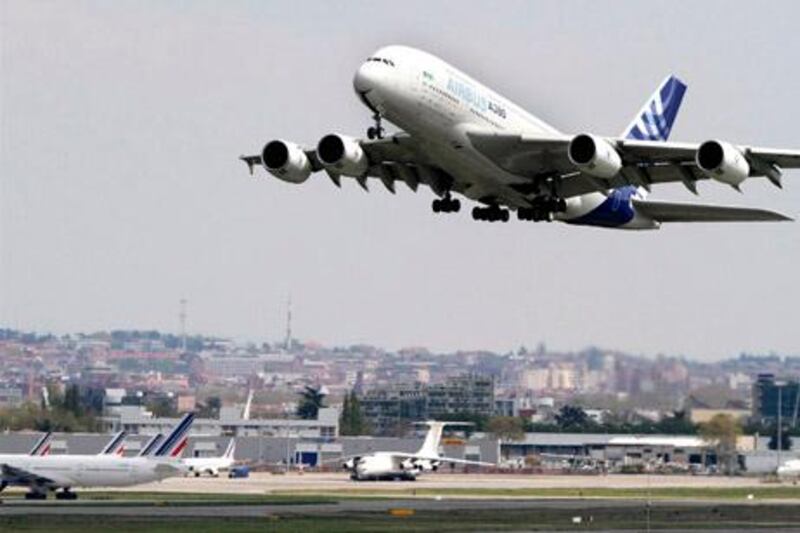Airbus hopes a software upgrade for its A380 superjumbo will end a series of embarrassing glitches that occurred with its first clients, including Emirates Airline. The changes, if they work, are expected to help Airbus gain momentum in selling the superjumbo, which has yet to reach break-even despite its popularity with airlines and passengers.
In March last year, Emirates produced a 46-page report for officials at the Toulouse-based aircraft maker, detailing breakdowns that grounded the first four A380 aircraft in the Emirates fleet for 500 hours in the first 18 months of operation. Other problems have been reported with other launch customers such as Singapore Airlines and Qantas. "The improvements are mostly of a software nature," Richard Carcaillet, the director of product marketing for the A380 at Airbus, said yesterday at the A380 wing factory in Broughton, Wales.
Upgrades in Airbus's electronic systems have already been offered to its newest A380 customer, Air France, while aircraft in operation will receive the new software during stopovers in Europe or routine maintenance, Mr Carcaillet said. "It has been irritating, with [problems] causing delays that should not have happened," he said. As of last year, reliability for the A380 was an average of 97.5 per cent, Mr Carcaillet said, and Airbus hoped to surpass 98 per cent soon.
"Reliability is still not at its target but we are steadily getting closer," he said. Airbus has won only one new client for the superjumbo since commercial operations began in 2007, and questions have been raised about its profitability. To date, Airbus has accumulated 202 orders for the A380; more than 200 aeroplanes shy of break-even, analysts say. "There is only a handful of routes you can use the A380 on and if traffic drops on that route you're stuck," Richard Aboulafia, the vice president of the aerospace analysis company Teal Group told Bloomberg. "The A380 is best regarded as a US$25 billion (Dh91.82bn) write-off and an act of industrial irresponsibility."
Saj Ahmad, the chief analyst at FBE Aerospace, said Airbus was "still deeply wounded" by production challenges. "Programme costs have more than doubled while the market for very large jets continues to shrink," Mr Ahmad said. This has increased pressure on Airbus to prove the existing aircraft have surpassed expectations to generate additional sales for the jet, which costs $300m but is thought to be significantly discounted.
Mr Carcaillet said intense media scrutiny had magnified any problems encountered by the first users of the superjumbo. "The high profile incidents are the flip side of being the new icon of innovation," he said. "As soon as there has been an issue, the press has been there." Airlines generally have reported more passenger comfort in the A380 with more space per passenger and less cabin noise. Singapore Airlines, which operated the first A380, dubbed it the "new queen of the skies" and said it surpassed airline's expectations for operating economics.
Singapore and Qantas have reported the jets flying 83 per cent full "during the worst downturn in civil aviation", Mr Carcaillet said. Meanwhile, Tim Clark, the president of Emirates, has called the A380 "great crowd puller". "Our flights are full and it generates its own traffic," Mr Clark said last year. Other Middle East customers include Qatar Airways and Etihad Airways, which pushed back its 10 deliveries by two years to begin in 2014.
igale@thenational.ae





